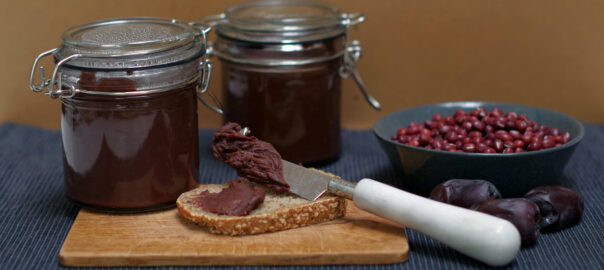Yoga Kitchen – Simple, healthy, and plant-based
Beans are super versatile
How do you get kids to eat beans? Preferably as early and as regularly as possible. In the recipe below, azuki beans are processed in an unusual way to make a delicious chocolate-flavoured spread. This is much better than the commercial, usually excessively sweet chocolate spreads that are high in sugar, fat and also often contain cow’s milk.
Azuki beans can be found in the organic section of regular supermarkets or at organic shops and organic supermarkets. They are small, red-brown beans with a white spot in the middle. They are native to China or Japan.
Azuki beans are very healthy and have a slightly sweet flavour when cooked.
This is what you need
To fill two glass jars of about 225ml capacity, take:
- 100g dry azuki beans
- 7 soft dates (mazafati or medjoul)
- 30g unsweetened cocoa powder
- savory
- some dried seaweed, such as sea lettuce for example
- a tiny pinch of sea salt
This is how to prepare them
- Soak the azuki beans in plenty of water for 24 hours.
- Then pour off the soaking water and rinse them well.
- Cook the azuki beans until tender in unsalted water with some seaweed and savory.
- Let cool.
- Scoop the cooked beans, cocoa, pinch of salt and pitted dates into a food processor with an S-shaped blade.
- Mash to a smooth paste. If necessary, scrape the sides of the cup occasionally.
- Spoon the chocolate paste into jars and store in the fridge.
All done!
How to cook azuki beans?
We’ve started off with 100 grams of dry azuki beans in this recipe. Dry beans that you can buy in bulk store easily and are low in packaging. After soaking, the weight of the beans has doubled to almost 200 grams. After cooking, the wet bean mass weighs about 350 grams, including the seaweed and bean sprouts. So you could also work with pre-cooked canned azuki beans for this recipe. In that case, take about 350 grams of canned azuki beans.
Important: always cook dry beans without adding salt. Otherwise, the skin will harden and it will be very difficult to cook the beans until tender.
Take as the volume for the water about 3 to 4 times the volume of the (dry) beans.
Cook the azuki beans for about 1 hour on a gentle heat until tender in a classic pan with a lid. Scoop away any foam that floats to the top with a skimmer until the water remains almost clear. Then add some savory and some seaweed such as sea lettuce. This provides extra minerals and you hardly taste it in the end result.
I always cook the beans in a high pressure cooker for the sake of saving time and energy. Bring the beans to the boil and leave the lid loose on the pan for the first few minutes to then easily scoop away the foam here too. When the water remains reasonably clear, close the cooker and bring under pressure.
30-35 minutes of pressure cooking is enough to cook the azukis.
The taste test and health verdict
This naturally sweetened chocolate spread is rich in fibre yet contains a lot of valuable protein thanks to the azuki beans and cocoa. Low in fat, this spread is an ideal way to get children to eat legumes. And as an adult, you can continue to enjoy that heavenly experience on a slice of toasted wholemeal bread, completely plant-based and without the harmful side effects of the overly sugary and nutritionally inferior chocolate spreads on the market.
Moreover, you can also use this chocolate spread as a top or interlayer for pastries.
Choose ethical cocoa
Cocoa, like chocolate and also coffee, can be considered a luxury product or even an occasional pleasure food originating from tropical regions. Therefore, choose cocoa of ethical origin preferably. Look for brands, labels and certification that offer real guarantees that no child labour was involved. Because some of those labels look promising, but in practice mean little or nothing.
The much-used UTZ label is a telling example.
Choco paste made from azuki beans and dates, per 100 grams of product:
| Energy | Carboh. | Sugars | Fat | Sat. Fat | Protein | Fibre | Salt |
|---|---|---|---|---|---|---|---|
| 752 kJ/180 kcal | 42,8 g | 20,7 g | 1,0 g | 0,4 g | 6,1 g | 6,2 | 0,06 g |
Participate in our cooking classes:
Read more about plant-based nutrition and health:
Read more about plant-based food
Find out about yoga and yoga classes in Schaerbeek:
Check out our yoga classes here:

